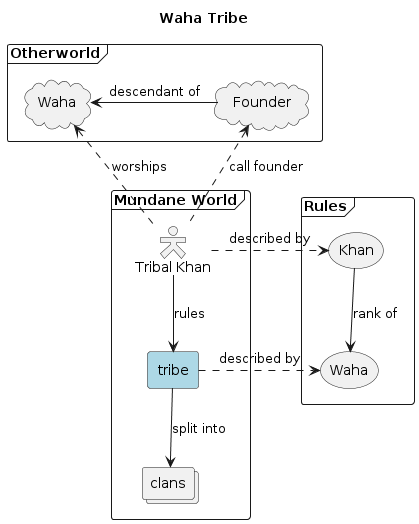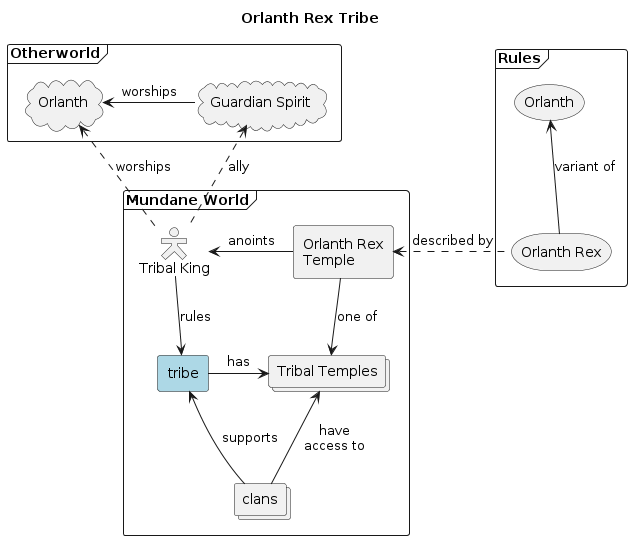Cults of Runequest: Tribes
The previous blog entry described how clans work in the Runequest rules. However, in Dragon Pass, almost all clans are organised into tribes and tribal federations, which add an extra level of complexity and options. As such, to a clan member, being part of a tribe offers opportunities that a clan by itself could not support.
In Runequest a tribe is an alliance or federation of clans. Tribes typically number in the thousands or more, so it is unlikely for anyone to know everyone. Unlike a clan, a tribe doesn't naturally generate a wyter, or community spirit. This means that leadership at the tribal level will require explicit magical infrastructure to support it. This is described in the Runequest rules as a cult.
There are two types of tribal organisation described by currently-published cults:
- In Prax, the Waha cult teaches tribal khans to summon a legendary founder.
- In and near Dragon Pass, the Orlanth Rex subcult anoints tribal kings (also know as a Rex).
It is likely others exist elsewhere in Glorantha.
Waha Tribe

The animal nomads of Prax are organised into tribes, where each tribe is a specific type of riding animal (bison, high llama, and so on). As nomads, they have very limited access to temples, which must be portable to move with the herd. So they mostly rely on shamanic priests of Waha, and Eiritha priestesses trained at the single major temple complex of the Paps.
Each tribe is ruled by a single individual known as the Tribal Khan. Waha shamanic priests teach the legitimate Khan the Rune Spell Summon Founder, which is both proof of the legitimacy of their status, and a means of enforcing it. In most tribes, it is those Waha shamans who picks the Khan. But in the Morokanth and Sable clans there is a tribal queen, a High Pirestess of Eiritha, who has a a joint leadership role, and a major say in picking the Khan.
Dividing the tribe into clans (which raise children) and warbands (which don't) is at the discretion of the Tribal Khan, who appoints their khans. Some clans have a long tradition and a khan would be unwise to permanently splitting them, or appointing an outsider as their khan. Others are just temporary divisions, forced by military strategy, or the necessity of avoiding overgrazing of a single area. Storm Bulls warbands are led by a Storm Khan, and are largely independent of the tribe, fighting their own battles with Chaos.
The cults of Waha and Eiritha provide the necessities of survival, and so are the foundations of society. Magic beyond that necessary for common survival is a matter for the individual, and is typically treated pragmatically. The temples of settled people often offer useful magic at a lower price than a tribal shaman would charge. So a tribesman might well be an initiate of Orlanth or Humakt, and it would be impossible for anyone unfamiliar with the tribe to know whether they got that status from a Pavis temple or a shamanic spirit cult.
Orlanth Rex Tribe

The Orlanthi tribes of Dragon Pass are organised alliances between clans, which are the fundamental social unit. Clans can leave one tribe and join another while keeping their identity.
All tribes have a small town or fort, which contains a selection of tribal temples. These temples are available for worship and magical instruction by all clans, and are maintained by the revenues the clans pay to the tribe. This revenue also supports the tribal king and his retinue, and any warband the tribe maintains. Almost all residents of the town are members of one of the clans of the tribe, to which they pwn their primary loyalty.
Tribal leadership is organised around the subcult of Orlanth Rex, representing Orlanth's claim to be King of the Gods. The tribal Orlanth Rex temple to is responsible for selecting a tribal king to rule the tribe. Atribal king must worship Orlanth, although it need not be their only, or even main, cult. They receive an especially powerful allied spirit in the form of the tribal Guardian Spirit, even if they are only an initiate. This spirit is typically not a community wyter, as the tribe itself is not a permanent settled community. Instead, it is often bound into tribal regalia held by the Orlanth Rex temple.
For example, the Colymar tribe is based around Clearwine Fort. As a traditionalist tribe, the Colymar send their militia to war when needed, led by the thanes of each clan. Other tribes instead organise those thanes into a permanent military formation, such as the Headhunters of the Culbrea.
Header image: Cardiff castle mural showing Silurian tribesmen fighting the Roman military.
By Steve F-E-Cameron (Merlin-UK) - Self-photographed, CC BY-SA 3.0, https://commons.wikimedia.org/w/index.php?curid=2052071
Edited by radmonger

3 Comments
Recommended Comments